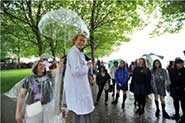Soapbox Science, a collaboration between the Zoological Society of London (ZSL) and L’Oréal-UNESCO For Women in Science, aims to eliminate gender inequality in science by raising the profile, and challenging the public's view, of women and science.
Founded by Dr Seirian Sumner from Bristol's School of Biological Sciences and Dr Nathalie Pettorelli, a research fellow at the ZSL, Soapbox Science is championing a change in gender inequality in STEM (Science, Technology, Engineering and Mathematics) by highlighting the struggles many women face when pursuing a career in scientific research. Its long-term priorities are to change the game for women in science by campaigning for equality and good practice in society, academic institutions, and government.
Soapbox Science strips away the PowerPoint presentations and jargon to bring the best of science to the streets. Now in its fourth year, the event features some of the UK’s top female scientists from the fields of biology, physics, chemistry and engineering. The speakers will take to their soapboxes to talk passionately about their subjects and answer any of the public’s burning science questions.
The event has gathered support from renowned institutions including the British Ecological Society, Society of General Microbiology, Francis Crick Institute and the British Society for Antimicrobial Chemotherapy, demonstrating the importance of tackling gender inequalities in science. And, this year, actor, writer, comedian and science populariser Robin Ince is lending his support by hosting a Speaker’s Workshop to meet the Soapbox Science speakers and provide insight into science communication to the masses.
Dr Pettorelli said: "Now in its fourth year, Soapbox Science is a platform to showcase the most eminent female scientists in the UK, and to highlight some very serious issues that we have witnessed as mid-career scientists: the disappearance of our female peers. We cannot afford to lose any more brainpower to gender inequality, as it is unfair that women should have to accept that they are battling against all odds if they want a career in science.”
Dr Sumner added: "Through events like Soapbox Science and our Campaign for Change, we want to actively bring women of all career stages together and promote that women can have a career in science. More broadly, the STEM community needs visible female role models, like our speakers who are willing to engage, and share their experiences to push for implementation of new measures. We hope that our event will inspire a new generation of scientists and highlight that with a few small changes, such as career breaks and part time working, the female ‘brain drain’ doesn’t have to exist."
This year's event takes place on Friday 5 July from 12pm to 3pm at The Southbank, (Gabriel’s Wharf), London, SE1 9PP
Campaign for Change
Institution-based support for scientists in the early years must improve. In science, the early career years demand a high level of instability with scientists moving between short-term, low paid contracts in order to build the experience and diverse skill set required to secure the much sought-after permanent positions. With these years perhaps coinciding with the time when many may wish to start a family, there can be conflicting demands which put enormous pressure on young scientists. Without institution-based support, such as affordable child care, most early career scientists who become parents find the bulk of their salaries consumed by nursery fees, often making it unaffordable to continue working. Institutes and universities must take responsibility in reducing pressures on early career scientists by making it acceptable for them to balance work demands and personal responsibilities, and help them to do so.
Government policy should change to allow men to take equal responsibility in family life. The power for change also lies with men. In relationships where the man and woman take an equal role in childcare and parental leave, the woman is likely to find it much easier to have a career in science. However, it is currently not perceived as socially acceptable for men to be taking on part-time work, flexible work or substantial parental leave. To increase the representation of women in STEM fields, we need to make career breaks and part-time work more acceptable to men. Changing social norms to reduce the loss of women from science is perhaps the most challenging yet important and wide-reaching change needed.
The visibility of women in science must be enhanced. Visibility is an important component of a scientist’s career. Helping female scientists improve their profile is a powerful way to help build opportunities for themselves, and increase the likelihood of them staying in STEM careers. The STEM community needs visible female role models, willing to engage and share their experiences to ensure women's representation in science improves. Events such as Soapbox Science help to raise female scientists’ profiles.
Read Dr Sumner and Dr Pettorelli's letter to The Guardian (27 June 2013) about Campaign for Change.


